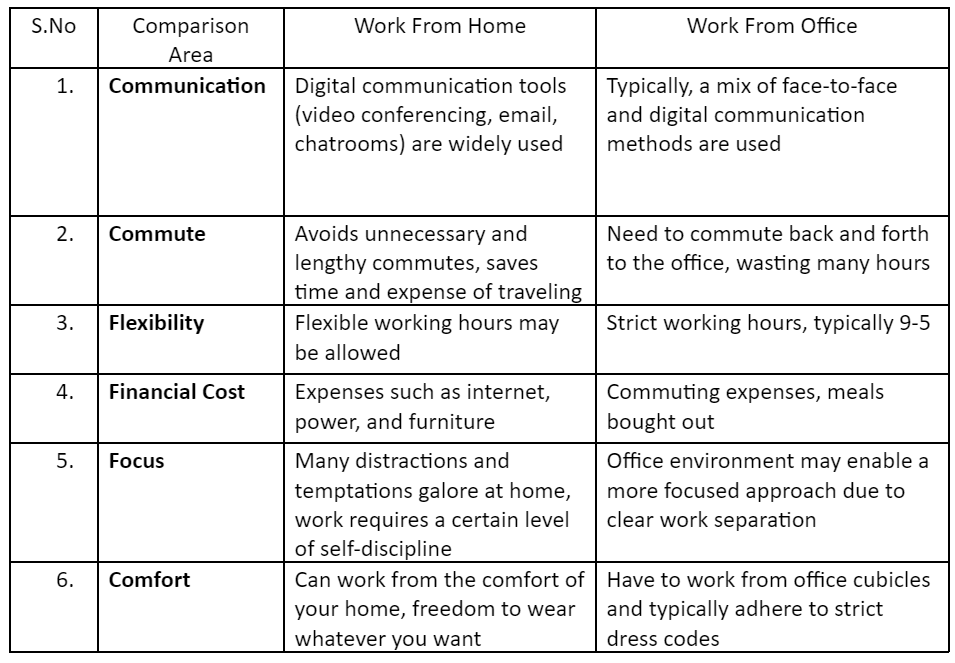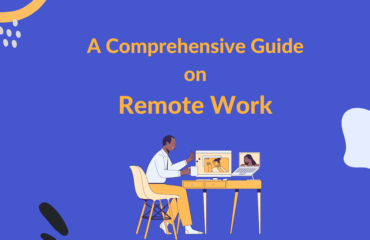Table of Contents
The Covid-19 pandemic has drastically reshaped the concept of work and the workplace. Companies are increasingly becoming ‘virtual-first’ and embracing new models of working. Work from home (WFH) is no longer a passing fad but has become the new normal for businesses worldwide. According to a 2022 study, a quarter of jobs in the United States and Canada are now permanently remote, and the number of virtual positions being advertised is growing sharply.
Work from home (also referred to as remote or virtual work) is a type of working arrangement that allows an employee to work outside the physical constraints of a traditional office in a location of their choice. If you’re searching for remote jobs, many opportunities exist across different job categories, industries, and career levels. In this article, we will discuss the advantages and challenges of remote working and provide tips and resources for remote workers.
Work From Home Benefits for Employees
a) Location independent
One of the biggest benefits of a remote job is that you are no longer tied to the physical constraints of your office. You can work from home, your favorite cafe, or a co-working space, as long as you can communicate with your team and deliver quality work. Also, work-from-home jobs allow you to access a broader range of job opportunities. It can especially benefit job seekers in smaller towns who don’t want to move to metropolitan cities to build a career. However, some companies may require you to make occasional visits to the office, so it’s important to check these details with your employers beforehand.
b) Financial savings
A work-from-home arrangement could lead to increased financial savings. Besides saving on commuting expenses, remote workers could retain the money they would otherwise be spending on a professional wardrobe, lunches bought out, and daycare programs for their children. Although, working at your home office may lead to greater spending on furniture, Wi-Fi connection, and electricity. Thus, before making the switch, we recommend checking with your employer if they offer any reimbursements to offset such expenses. Typically, employees in the United States can save between $600 to $6000 annually by working remotely half the time.
c) Increased productivity
When working in an office, your schedule is hardly your own. With constant interruptions from colleagues, gossip between peers, and an endless to-do list from your boss, it can be challenging to develop concentration. On the other hand, remote employees tend to enjoy lesser interruptions from co-workers, office politics, and casual chats while working. They also benefit from a quieter environment and lesser (or more productive) meetings. According to research, 67% of employees are more productive while working from home.
d) Time savings
The working people in the United Kingdom spend approximately an hour daily traveling to and from their office, with many even commuting for two hours or more for work every day. Long travels often lead to high-stress levels and poor well-being. Besides, you may encounter situations beyond your control, such as vehicle breakdowns, traffic jams, and rude passengers, which could increase your time on the road and worsen your mood.
When working from the office, you are likely to spend many valuable hours on lengthy commutes, getting dressed for the office, and socializing. By working from home, you can reclaim one of the most precious resources- your time, and use it how you’d like. You could squeeze in more work or focus on personal priorities such as spending time with family, working out, or getting extra sleep.
e) Accommodate special needs
Work-from-home can help provide more equitable opportunities to marginalized groups, reducing barriers to entry for many workers and giving employers the chance to hire a more diverse workforce. Remote jobs are especially a big boon for individuals with physical or mental disabilities, who may find it challenging to do a traditional 9 to 5. By working remotely, you have the opportunity to build your careers in the comfort of your homes, which are typically better equipped to support your personal needs. Besides, you could benefit from greater flexibility to accommodate healthcare appointments when needed.
f) Customized workspace
At an office, you can modify your cubicle with some plants, family photos, and other knick-knacks to a point. But with your home workstation, you can exercise complete creative control and truly make the space your own. You could play your favorite music, set the thermostat to your comfort level, or work in your special oversized chair. With the environment specially tailored to your work preferences, you are likely to be your best self and get more work done.
g) Positive environmental impact
The biggest source of greenhouse gas emissions in the United States is transportation. Remote working can lead to fewer vehicles on the road, which results in reduced carbon footprint and environmental sustainability gains. According to a study, greenhouse gas emissions could decline by 50 million tons annually if employees worked from home for even half a week. Also, remote working often leads to increased digitalization, which could result in massive paper savings. Lastly, remote workers’ power consumption also tends to be lower than in-office employees.
h) Daily life can become easier to manage
With remote jobs, you could use work breaks productively to finish quick domestic chores. This means you can have more leisure time to enjoy without worrying about your to-do lists. WFH may also make it easier for you to manage your kids or look after your parents.
Some WFH jobs also offer flexible hours, so you can not only control where you want to work but also when, as long as you get the job done. This freedom over your work timings can be highly beneficial when it comes to your individual needs. Whether you need to take a quick grocery run, drop your kids off at school or attend an online yoga class, your daily life may be easier to manage when working for a remote employer.
Work From Home Benefits for Employers
Companies benefit from remote work arrangements as much as their employees do. Firstly, remote employers can access a bigger talent pool since they aren’t restricted to hiring local candidates. They can choose the ideal candidate from a much broader demographic.
Also, research indicates that remote employees tend to be more productive and thus perform better. WFH jobs typically lead to higher employee retention rates since individuals who would have otherwise quit their job due to life changes like relocation and family commitments are likely to stick around. With a work-from-home arrangement, companies generally enjoy lower operating overheads since they tend to spend less on real estate space, office supplies and perks, and energy bills.
Work From Home Challenges for Employees
a) Work-life separation
Separating your professional and personal life can be challenging when working from home. When your home also serves as your office, the boundaries between the two can often get blurred. Many remote employees complain that they end up working around the clock since they have no definite start or end times. When work gets demanding, it could seep into your leisure time, disrupting your work-life balance, and eventually leading to burnout.
Solution:
Fixing a daily routine is crucial to achieving a work-life balance in a remote job setting. Establishing where the work is to be done (a dedicated home workstation) and when it’s to be done (sticking to a set timetable) can help you be on the right track. It is also important to set healthy boundaries with your employer, so you don’t overextend yourself.
Loneliness is one of the biggest challenges that remote employees face. Human beings are social animals that thrive on interaction. In a work-from-home arrangement, employees often end up spending their day glued to their laptop screens alone, missing out on the opportunity to develop social ties and network with their co-workers.
Solution:
To combat loneliness, you could consider scheduling occasional in-person meetings with local team members (if any) or organizing virtual social meet-ups with co-workers. Working out of a café or co-working space may also help you deal with social isolation. Besides email, we recommend adopting video conferencing to communicate with your team. It helps increase human interaction and foster trust.
c) May experience bias
In a hybrid work model, fully remote employees may have to deal with proximity bias, which is the tendency of individuals in authority to favor workers who are closest to them physically. For example, your employer may recognize the efforts and contributions of the in-office employees more. As a result, you could miss out on promotions, important projects, or bonuses.
Solution:
If you are interviewing for jobs, ask the prospective employers how they will assess your performance and what policies they follow to ensure all employees, including remote workers, have fair advancement opportunities. If you feel WFH employees get overlooked for opportunities in your present company, you should raise your concerns and advocate for better inclusion with your employer.
d) Work interruptions and distractions
Work interruptions and temptations at home can sometimes be productivity killers for remote workers. You may be in the middle of an important client meeting when you suddenly find yourself distracted by the doorbell ringing, your child watching a movie, or your dog barking. Also, with the lack of oversight from your manager, you may be tempted to finish the last episode of your favorite show or quickly tidy your room.
Solution:
To minimize distractions, identify a quiet spot in your home for work. It can be helpful to set expectations about your availability with your family. Also, allow yourself to enjoy the temptations at home in small doses. This way, you can keep them in check. In fact, distractions are present everywhere, in the office and at home. By building good habits and being disciplined, you can effectively overcome them.
Work From Home Challenges for Employers
Employers may find it challenging to manage a remote team that is spread across different continents. With employees working across varying time zones, collaborating on projects might get difficult. Further, the cultural norms and professional etiquette may differ across geographies, which could lead to miscommunication.
Companies with a remote team may also have to deal with various technical issues. If a team member’s internet connection fails or their computer breaks down, it could disrupt the entire team’s workflow. Also, a company might face many potential security risks like online hacking and external breaches, which could lead to data exposure.
Solution:
Companies should adopt a fast, comprehensive, and easy-to-use communication application so the team can collaborate effectively across distances. Companies should also provide cloud storage, so employees don’t store sensitive data on their hard drives. Additionally, it would help if employers offer employees a tool to share their workflows, so they don’t constantly have to check in with each other.
To address technical challenges, employers can consider having a remote helpdesk to support the workers when things go wrong. To mitigate cybersecurity risk, companies can organize online training regularly to highlight best security practices. They could ask employees to use virtual private networks to connect to the company’s files.
Tips to Increase Productivity While Working From Home
If you work remotely, it is crucial to find methods that enable you to stay productive and keep your work organized. By making a few adjustments and following some habit-building strategies, you can achieve optimal focus even amidst the many temptations at home. In this section, we cover productivity tips that can help boost your performance and keep you motivated in your home office setup:
- While working from your bed or couch may be tempting, avoid doing so. It is vital to dedicate a space in your home for work. Doing so will train your brain to associate the bedroom with sleep and your desk with your job, making it easier for you to shift your energy levels accordingly.
- Set a decompression activity that marks the end of your day. It is a great way to develop a clear boundary between your office hours and leisure time. It can be anything as simple as a breathing exercise or a walk around the block.
- While many remote workers enjoy working out of their sweatpants, this may not be ideal for all. Consider dressing for work if you’re feeling sluggish and unproductive. It can help change your mindset and get you in the work mode.
- Setting ground rules about your availability with your children and spouse can help avoid interruptions. You could consider hanging a ‘Do Not Disturb’ board when you are in important client meetings or working on tasks that require deep focus.
- While working from home, one can easily lose track of time, so adopting some time management techniques could be beneficial. For example, the Pomodoro technique is excellent for avoiding distractions and staying productive.
- Without physical supervision from your manager, you may sometimes feel overwhelmed with your job. Thus, it is important to communicate with your co-workers regularly and ask for support when needed.
Best Websites to Find Remote Jobs
Are you looking for work-from-home opportunities? In this section, we have compiled a list of the best remote job websites to help kickstart your job search process. Job seekers across different industries, functions, and career levels can use these portals to find suitable remote employment.
While the above-mentioned websites feature remote opportunities only, many traditional job boards, such as LinkedIn, Monster, and Indeed also advertise work-from-home jobs. These job boards have a “work from home” filter so you can easily filter out such jobs. After identifying your target vacancies, we strongly suggest focusing your efforts on creating a well-crafted resume so you can effectively demonstrate your suitability for the role.
Work From Home vs. Work From Office
The preference comparison between work from home vs. work from the office has been the most discussed debate in the professional world, especially after the Covid-19 pandemic. The advocates of both sides provide reasonable arguments for their stance. In the table below, we compare both the models on different factors:
Work from home is here to stay and provides greater opportunities for flexibility and independence to many individuals. But the benefits for some may be challenges for others. Thus, it is vital to understand your preferences and needs to determine your ideal employment type. Are you feeling confused about whether remote employment is suitable for you or don’t know how to make the shift? Reach out to us for help.












